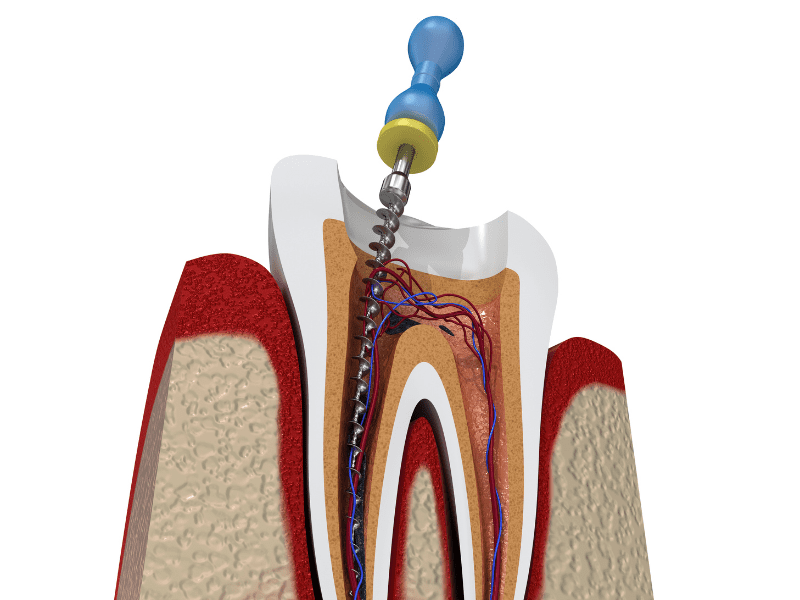Root Canal Treatment Cost In India
The cost of root canal treatment in India can vary based on several factors, including the city or region, the dentist’s experience, the tooth’s location, and the complexity of the procedure. Additionally, the cost may also depend on the type of dental clinic or hospital where the treatment is performed. Here’s a general idea of the cost range for root canal treatment in India:

- Single Root Canal Treatment (RCT) for a Tooth:
- The cost for a single-root canal treatment for a tooth can range from ₹2,000 to ₹6,000 or more, depending on the factors mentioned above.
- Multiple Root Canal Treatment (RCT) for a Tooth with Multiple Canals:
- If a tooth has multiple canals, the cost may be higher. The range for multiple-root canal treatments can be ₹4,000 to ₹10,000 or more.
- Cost of Dental Crowns (Cap) After Root Canal:
- After a root canal, a dental crown is often placed to protect and strengthen the treated tooth. The cost of dental crowns can vary from ₹3,000 to ₹15,000 or more, depending on the material used (metal, porcelain-fused-to-metal, all-ceramic, etc.).
It’s important to note that these are general estimates, and the actual cost can vary. Factors that may influence the cost include:
- Location: Dental treatment costs may vary between cities and regions in India.
- Dentist’s Experience: A more experienced dentist may charge higher fees for their services.
- Clinic/Hospital Type: Costs can differ between private dental clinics and government hospitals or dental colleges.
- Additional Procedures: If additional procedures, such as post and core buildup, are required, they can contribute to the overall cost.
Before undergoing any dental procedure, it’s advisable to consult with a dentist, discuss the treatment plan, and get a detailed cost estimate. Additionally, dental insurance coverage, if applicable, can also impact the out-of-pocket expenses for the patient. Keep in mind that the information provided here is based on general estimates, and actual costs can vary based on individual cases and circumstances.
Here are five frequently asked questions (FAQs) about root canal treatment:
It’s important for individuals to consult with their dentist if they are experiencing tooth pain or other dental issues to determine whether root canal treatment is necessary. Dentists can provide personalized information based on the specific needs of each patient.
What is a Root Canal Treatment (RCT)?
Root Canal Treatment (RCT) is a dental procedure that involves removing the infected or damaged pulp (soft tissue) inside a tooth. The pulp contains nerves, blood vessels, and connective tissue. After the removal, the inside of the tooth is cleaned, disinfected, and sealed. This procedure is performed to save a tooth that would otherwise need extraction.
Why is a Root Canal Needed?
A root canal is needed when the pulp inside a tooth becomes infected or inflamed due to deep decay, repeated dental procedures on the same tooth, a cracked or chipped tooth, or trauma. If left untreated, the infection can lead to severe pain, abscess formation, and the loss of the tooth.
Is Root Canal Treatment Painful?
Contrary to common misconceptions, modern root canal treatments are typically not painful. Local anesthesia is administered to numb the affected tooth and surrounding area, ensuring that the patient feels minimal to no pain during the procedure. After the anesthesia wears off, some discomfort or mild pain may be experienced, but this is usually manageable with over-the-counter pain medications.
How Long Does a Root Canal Procedure Take?
The duration of a root canal procedure can vary based on the complexity of the case. On average, a single-root canal treatment may take about 1 to 2 hours. Multi-rooted teeth or cases with complications may take longer. In some instances, the procedure can be completed in multiple appointments.
What Happens After a Root Canal?
After a root canal, the treated tooth is typically restored with a dental crown (cap) to strengthen and protect it. Patients are advised to practice good oral hygiene, including regular brushing, flossing, and dental check-ups. Following the post-treatment care instructions provided by the dentist is crucial for the success of the procedure. With proper care, a tooth that has undergone a successful root canal can last a lifetime.